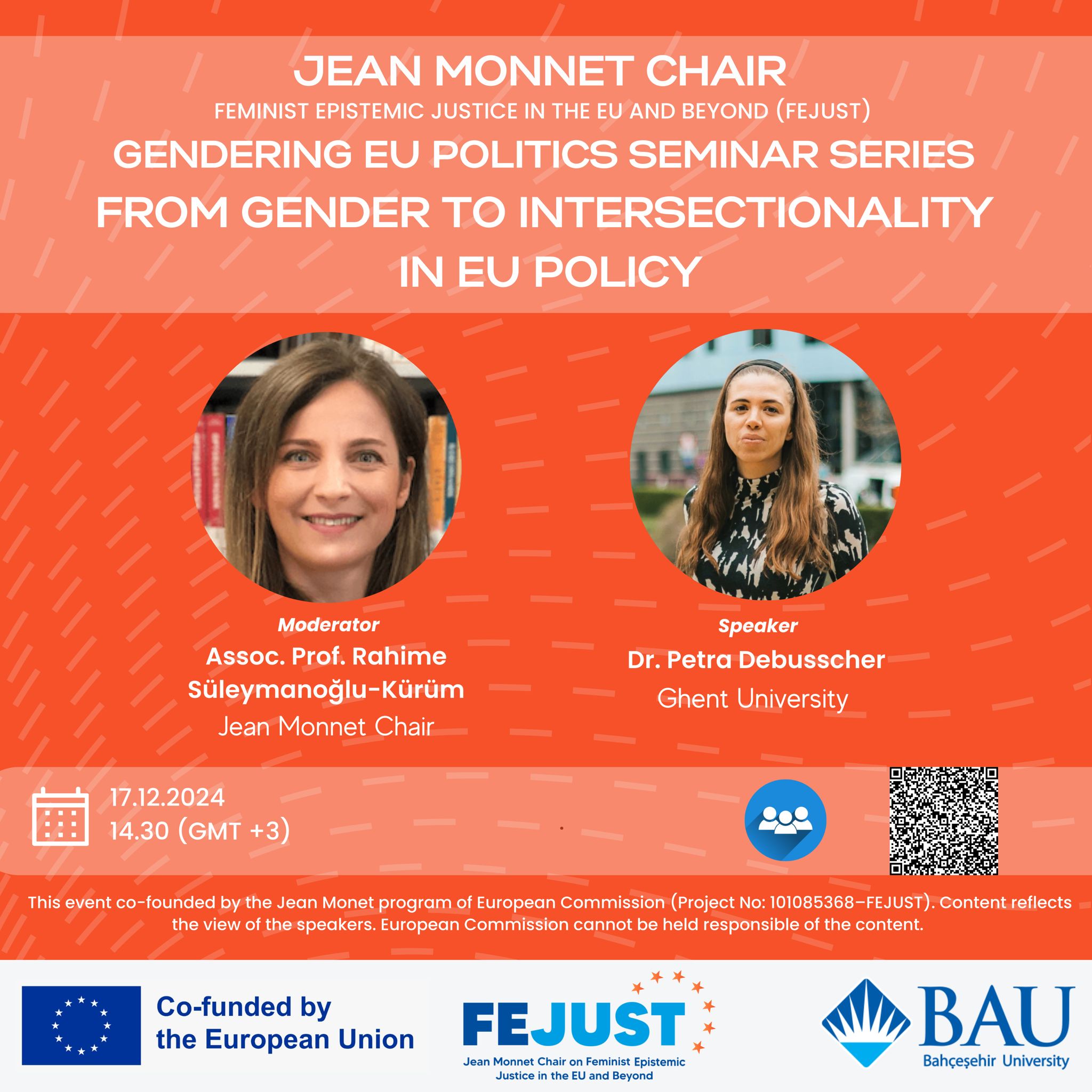Gendering EU Politics Seminar 10
Title: Advancing Intersectionality in EU Equality Policies
Date: 17 December 2024
Speaker: Dr. Petra Debusscher (Ghent University)
Moderator: Rahime Süleymanoğlu-Kürüm, Jean Monnet Chair, BAU

The 10th seminar in the Gendering EU Politics series featured an enlightening presentation by Dr. Petra Debusscher, researcher and lecturer at Ghent University with over 15 years of experience in gender equality and EU policy. Her extensive work as an independent gender expert for the European Commission, European Parliament, and European Institute for Gender Equality provided both academic and practical insights into the EU’s policymaking processes. The seminar attracted 27 participants, comprising of diverse audience of academics, policymakers, and civil society representatives, representatives of business, sparking a lively discussion on topics such as the EU’s external policy challenges, the role of civil society, and strategies for advancing intersectional equality in a politically fraught environment.
About the Speaker
Dr. Petra Debusscher is researcher and lecturer at the Ghent Institute for International and European Studies (GIES) at Ghent University, Belgium. She has 15+ years of experience in the area of EU policies and politics, gender and equality theory, gender mainstreaming and intersectionality. She is currently working on a research project 'The EU as a Global Gender Actor: Tracing Gender and Intersectionality in EU internal and external policies'.
In addition to her academic work, Petra has extensive experience working as an independent gender expert for EU institutions, including the European Commission (DG JUST, REA, DG INTPA…), the European Parliament’s FEMM Committee, the European Institute for Gender Equality and the European Institute of Innovation & Technology among others.
Presentation Overview
Dr. Petra Debusscher provided an in-depth exploration of the EU's evolving approach to intersectionality, a concept rooted in Black feminist advocacy that addresses overlapping systems of oppression. She outlined how the EU has incorporated intersectionality into its equality policies, particularly since the Von der Leyen Commission in 2020, which marked the first explicit use of the term at the EU’s highest levels. This shift, she noted, was accompanied by a series of strategic documents aimed at promoting equality, including policies addressing gender, anti-racism, LGBTQI+ inclusion, disability rights, and Roma inclusion. However, Dr. Debusscher emphasized that these policies often operate in isolation, treating inequality strands separately rather than holistically.
A significant focus of the presentation was the analytical framework she developed to assess the integration of intersectionality in EU policies. The framework, grounded in key debates from intersectionality theory, includes criteria such as the recognition of intersecting categories, attention to structural inequalities, and reflexivity in policymaking. Dr. Debusscher explained how the framework enables a systematic evaluation of EU policy texts, highlighting areas where intersectional principles have been embraced and where gaps remain. She presented findings from her analysis of several key EU strategies, noting how intersectionality is often framed as an "add-on" to existing approaches, rather than as a transformative framework addressing systemic power imbalances.
Dr. Debusscher also discussed the broader political and institutional context shaping EU equality policies. She highlighted the rise of right-wing populism and anti-gender movements across Europe, which have created significant challenges for advancing intersectional approaches. Despite these difficulties, she pointed to the progress made under the Von der Leyen Commission, including the recognition of structural racism in the Anti-Racism Action Plan and the emphasis on collecting intersectional data. She explained how civil society’s contributions have strengthened many of these strategies, particularly in areas like structural inequality and anti-discrimination efforts.
In closing, Dr. Debusscher reflected on the challenges and opportunities ahead for the EU’s equality policies. She acknowledged the complexities of advancing intersectionality in a politically polarized environment but expressed hope that the inclusion of intersectional principles in EU discourse represents a foundation for future progress. By engaging with civil society and adopting more context-sensitive approaches, she argued, the EU has the potential to make its equality policies more inclusive and transformative.
The presentation offered attendees a comprehensive overview of the EU’s efforts to integrate intersectionality, blending theoretical insights with practical examples from policy analysis. Through her detailed examination of EU strategies, Dr. Debusscher illuminated the potential and limitations of intersectionality as a guiding principle for equality policies in the European Union.
Political and Institutional Context
Dr. Debusscher emphasized the importance of understanding the broader political context in shaping EU equality policies. She highlighted the challenges posed by rising populism, anti-gender movements, and the increasing influence of right-wing parties within EU institutions. These dynamics create significant obstacles for advancing equality policies and have led to institutional changes, such as the downgrading of the equality portfolio in the new European Commission. Despite these challenges, Dr. Debusscher remained cautiously optimistic, citing the progress made during the Von der Leyen Commission and the enduring efforts of committed civil society and institutional actors.

Dr. Debusscher concluded her presentation by emphasizing the need for a more comprehensive and transformative approach to intersectionality in EU policies. She called for greater attention to structural inequalities, the inclusion of marginalized voices in decision-making, and a focus on privilege as a relational aspect of inequality. She also stressed the importance of small but meaningful steps, such as the inclusion of mandatory intersectional criteria in EU-funded projects, as a way to sustain progress in challenging political climates.
This seminar underscored the importance of feminist epistemic justice in rethinking EU policymaking. Dr. Debusscher’s critique of the fragmented approach to intersectionality highlighted the need for more inclusive and participatory frameworks that reflect the lived experiences of marginalized communities. Her work aligns with the Gendering EU Politics series’ mission to deconstruct androcentric and technocratic practices, advocating for more equitable and transformative policy outcomes.
Participants commended Dr. Debusscher’s analytical framework as a valuable tool for critically assessing EU policies and her ability to connect theoretical insights with practical recommendations. This event provided a vital platform for interdisciplinary dialogue, advancing the conversation on intersectionality and equality within the EU and beyond.